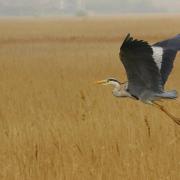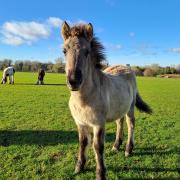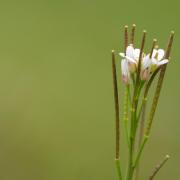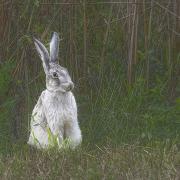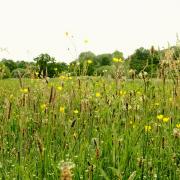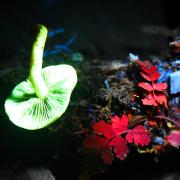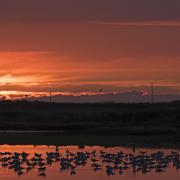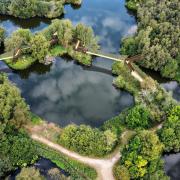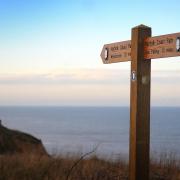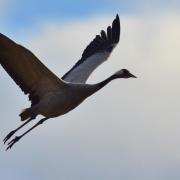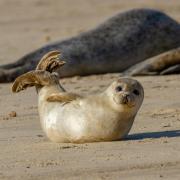Nick Acheson, Norfolk Wildlife Trust ambassador, on how you can help.
Not long ago, my father and I went for a walk around Blakeney. My father, George, had just turned 80 and I wanted him to share with me the places he had known and loved as a child.
We visited the imposing Victorian house in which he was born, the house by the church where he grew up, and the many houses in the village where his relatives had lived, including one built by his architect grandfather following the war, where I dimly remember visiting my great-grandmother as a little child.
All this was wonderful. But my father really came alive when he told me of his adventures in the surrounding countryside.
His father, Thomas, was the village doctor. To allow his children to pursue their love of horses, he rented two fields east of the churchyard. Almost certainly we were trespassing when my father led me through a rickety churchyard gate, bound in place with ivy, onto the fields which had been his childhood playground.
He showed me where his father had constructed stables for the horses; where they’d made a wall to jump on horseback; where they’d kept their ducks and chickens; where he’d ferreted for rabbits; and where his childhood dogs lay buried. Memories from the 1940s and 1950s tumbled from him as he described a childhood spent outside.

Though not everyone had the privilege of such an upbringing, every Norfolk childhood, at the time, was spent outdoors. It was unthinkable, in the 1950s, that a child could grow up never having climbed an oak tree, not having seen a bird’s nest, nor having eaten rabbit, partridge or wild duck taken from the countryside.
The world has greatly changed, of course. I’m not a Luddite, advocating that we turn back to some imagined paradise of the 50s. I’m writing this article on a modern laptop, answering messages delivered by the miracle of Wi-Fi (albeit while sitting in my garden, watching starlings nest-building in my swift box). Many aspects of the modern world make life both easier and more enjoyable. But some emphatically do not.
For many years I lived in South America, where I worked with indigenous people both in the icy highlands of the Andes and in the dry and humid forests of the lowlands. It was the privilege of my life. Innumerable times, over those years, I felt entirely stupid beside indigenous friends.
I am lucky to have sharp ears and eyes, and wherever I’ve lived I’ve tried to learn about local habitats and wildlife, but beside my indigenous friends and colleagues I was hopeless. They were part of their landscapes, reading them and navigating through them in a way which nobody in the developed world could understand.
Again, I’m not suggesting all of us should quit our homes and move to palm-thatched huts or take to medicating ourselves with foraged plants and fungi. But I do believe - indeed I know - that if we are to survive the climate and biodiversity crises that we in the developed world have caused, we must return to loving, understanding and honouring the habitats and landscapes we inhabit.

In which we ourselves, our cultures and all our fellow species have evolved. To save our wildlife, and ultimately save ourselves, we need to learn again that we too are part of nature; that we belong in her and she in us; and that without her we are nothing.
We will never return to indigenous knowledge of wildlife and landscape. Indeed, all across the world, indigenous cultures and their store of wisdom are under threat. There’s no reason, however, that we can’t return to the outdoors childhoods which my father enjoyed in Blakeney in the 1950s and which I enjoyed in Little Snoring in the 1980s. Nor is there any reason we can’t regain our landscape literacy or our understanding of the natural world. Indeed, to save ourselves we must.
It is this belief in wilder people and a wilder future that underlies 30 Days Wild, an annual Wildlife Trusts campaign aimed at getting everyone in society outdoors, exploring and enjoying nature, and rebuilding a relationship with it.
The challenge of 30 Days Wild could not be simpler. In every corner of the country, through every local Wildlife Trust, we invite you to sign up to 30 Days Wild, do one wild thing each day throughout the month of June, and tell us about your wild adventures.
What you do is up to you, but there’s no better time of year for falling in love again with Norfolk’s wildlife. Everybody - no matter where you live, how old you are, or how much time you have - can get involved, taking a moment every day in June to feel wild and free, connected with your landscape.
You could start by simply having lunch outdoors, feeling the breeze in your hair and the sun on your skin, lending attention - as so rarely we have time to do - to the sound of birds. It doesn’t matter - not a jot! - if your birds are city pigeons. What matters is listening, connecting to the truth that we are animals in a landscape which we share with countless other plants, fungi, protists and animals.

You can sit outside and paint the flowers that you see. You can jump into the chilly water of the sea. You can write a poem or a song about a mouse, a woodlouse or a spider. You can paddleboard along the Wensum, build a bee home, study lichens, dig a pond, sleep in the garden under canvas, climb a tree, jump in a muddy puddle, plant a hedge.
Just do one thing each day in June which reminds you of the joy of knowing nature and - through our website or on social media - tell us what you have done. Together - as we turn back to the wild - we will become an army of nature-lovers, ready to fight for wildlife, wild habitat and the environment. Together we are wild.
30 Days Wild
Sign up to the biggest nature challenge in the UK today and receive a free pack, loads of ideas for rewilding your world and access to an online calendar to record your adventures:
wildlifetrusts.org/30dayswild
Why not tag NWT with your wild adventures on social media?
Twitter: @NorfolkWT
Facebook: @NorfolkWildlifeTrust
Instagram: @norfolkwt





